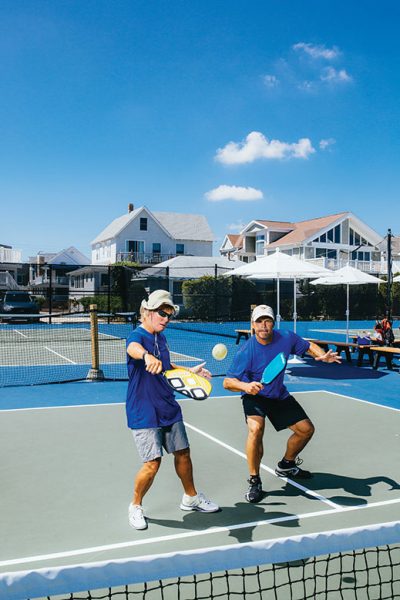
It’s tough to take this game seriously.
First, there’s the name: pickleball. Really? Next, there’s the wacky pop when paddle hits ball. Now, consider the makeshift courts in parking lots and the ultimate athletic indignity—a reputation as a sport for seniors.
This is not, in the realm of glam racquet games like tennis and squash, a recipe for respect. But pickleball has a powerful little secret.
“It’s fun,” shrugs a 20-something player heading with his buddy to a court in the Randolph YMCA, where I am awaiting my turn.
Pretty much anyone can learn to play pickleball. Last year, after studying from the sidelines, I borrowed a paddle, prepared for humiliation and dove in.
Experienced players say pickleball moves at roughly half the speed of tennis. But on court, the play feels fast, a little frantic and weirdly forgiving. Shots I expect to miss, I reach—swinging, jabbing and diving for the ball, a plastic sphere full of holes. It’s about the size of a navel orange.
After a few games with friends, I’m comfortable playing with strangers. In the Y gym, an accomplished player calls me off the bench for a doubles game. It starts with the regulation pickleball serve: I dip my racquet, toss the ball upward, let it drop below my waist and loft it over the 34-inch-high net. The receiver hits a short return, and I rush in to scoop it over the net. We trade volleys high and low until a swift shot zips unmolested past my paddle.
Two Washington State families, the Pritchards and the Bells, created pickleball almost 50 years ago as a form of friendly recreation. Some say they named it for the Pritchards’ dog, or maybe it was a crew boat; the story is vague. Today, pickleball is surging. In New Jersey, Ys, recreation centers and tennis clubs have been adding courts on gym floors, tennis courts, even pavement. The Princeton Racquet Club has eight outdoor courts; in Stone Harbor, six outdoor courts debuted last summer.
A pickleball game is short and social, with plenty of chatting on the sidelines. “All you’re hearing is a lot of laughter, and that’s the whole goal,” says Bill Giannetti, one of New Jersey’s 20 pickleball ambassadors appointed by the USA Pickleball Association (USAPA) to promote the sport.
Pickleball is played on a compact, 20-by-44-foot court. Paddles are made of composite plastics, wood or aluminum. There are two types of balls—with big or small holes. Indoor balls have the bigger holes.
It’s a game of errors, not winners. Players master the “dink”—a shot that drops low and short. The point continues until a shot yields a put-away. Beginners often rush toward the ball, whaling away for a winner, only to lose the point. “They dink and they dink, and then all of a sudden there’s a smash,” says Mitchel Storb, 19, who plays in Stone Harbor, where his parents are regulars.
A game ends when one team scores at least 11 points, with a two-point margin. Because games are short and mostly played as doubles, pickleball works as a pick-up game. Show up and you’re in. Usually organizers match players by ability. Stone Harbor uses beginner, intermediate and advanced levels; the Randolph Y, recreational and competitive.
The New Jersey Pickleball Association, with 323 members, mostly in northern New Jersey, offers clinics, lessons and free player assessments based on the USAPA ranking system. To find a game, check the USAPA or NJPA websites or meetup.com.
Freelance writer Patricia Herold never met a racquet sport she didn’t love.



